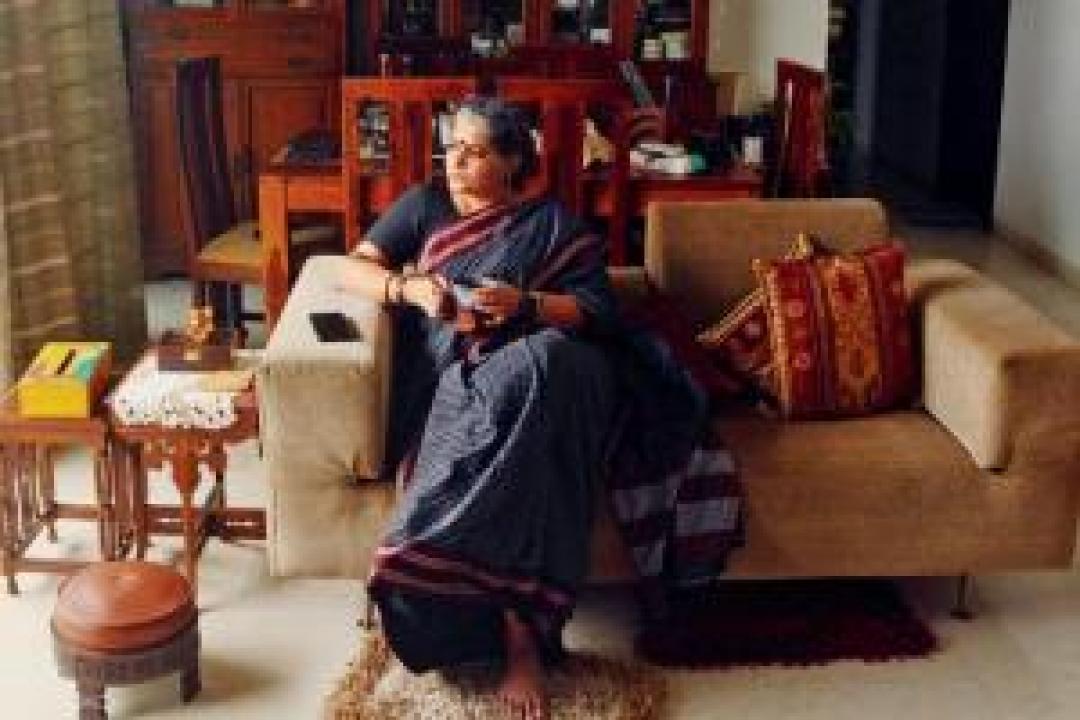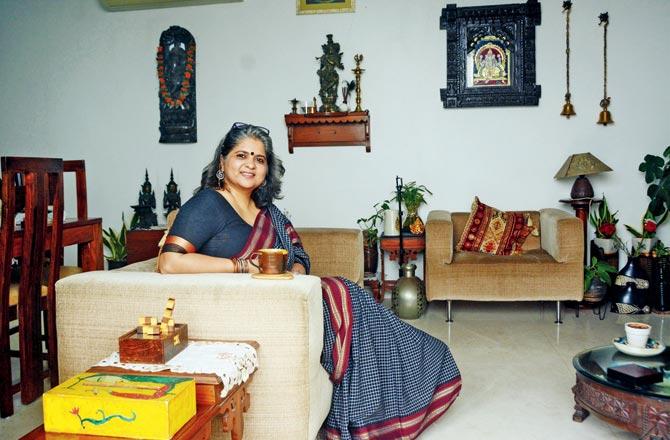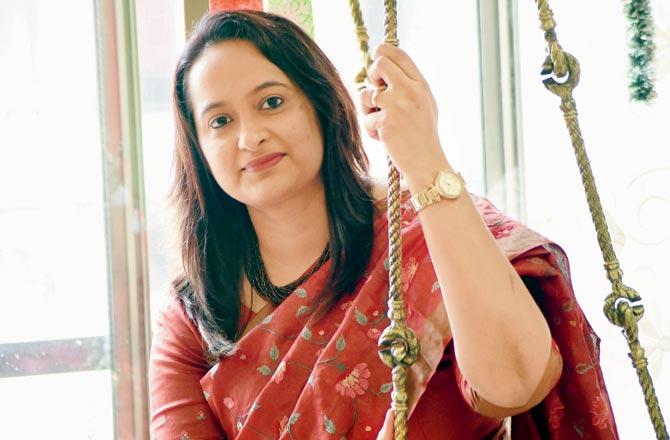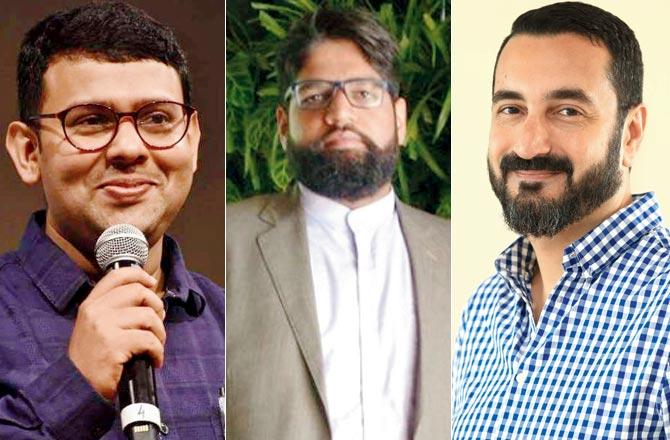Across Mumbai, psychiatrists, psychologists and other professionals working in the mental health sector, attest to a sharp increase in patient load by the end of April.

Bhavana Issar of Caregiver Saathi set up a helpline for caregivers of patients during the pandemic. "We dehumanise mental health experts, not allowing others to see the heartbreaking circumstances they work in," she says. Pic/Satej Shinde
The first week of the lockdown was like a vacation for us, just like everyone else. While others were enjoying the idea of working from home, we were on a break as hospitals were strategising about which OPDs to keep operational," says Dr John Senthilnathan, consultant psychiatrist at Powai's Dr LH Hiranandani Hospital and Holy Spirit Hospital in Andheri East. But, this, they would realise, was the lull before the storm.
ADVERTISEMENT
Across Mumbai, psychiatrists, psychologists and other professionals working in the mental health sector, attest to a sharp increase in patient load by the end of April.

Nidhi Jain, clinical psychologist-psychotherapist, volunteered as tele-counsellor
"There was a big surge in the number of patients I was seeing online, vis a vis in person. Pre-COVID, I didn't have an online practice at all. My schedule was five days a week, 9 am to 2.30 pm. These were the hours I chose for myself as I am a mother of two sons, whose day is full of activities." But, with the pandemic and the national lockdown, Dr Senthilnathan's schedule went for a toss. With patients not coming to the hospital to renew prescriptions, she'd be on the computer writing fresh notes. "This entailed more work. Calling up chemists and ensuring that the prescriptions were honoured, because patients can't miss a day of medication. In the later months, with isolation and being cooped up at home, there was a surge in depression and anxiety. There were also new patients and I was working extended hours."
Interestingly, a new lot had been added to her patient group—the nurses at the hospitals. "I started going to the hospital in April and here, we'd offer counselling to workers. Every day, I'd see around five nurses. We'd debrief them and try to boost their morale. They were surrounded by death and trauma. And, while earlier, patients would have their relatives around them, now they were being admitted alone; the responsibility of the nurses was greater." Between the online and offline sessions, a seven-day-a-week job, Dr Senthilnathan admits to experiencing exhaustion. "By June, I was fatigued. I recognised this as I was getting irritable at home. But, I didn't know what I could do as the need of the hour was to step up and see more patients."

Clinical psychologist and psychotherapist Nidhi Jain volunteered as a tele-counsellor for Project Mumbai's helpline and has been able to take a break only a few months ago since the pandemic broke. Pic/Sameer Markande
Even as the Coronavirus pandemic that's a year old now, has affected over 2.5 lakh people in Mumbai, and nearly one crore in India, its impact has been greater on mental than physical health, emphasises Oshiwara-based clinical psychologist and psychotherapist, Nidhi Jain. "This is also a mental pandemic. The number of people the virus has infected or those showing symptoms is a sizeable amount, no doubt, but we can count that number. Mentally, however, everyone has been affected, regardless of economic status or community. The toll is heavy. We are social beings and the first few months were terrible. We had people of all ages calling in, expressing anxiety, panic symptoms, difficulty in breathing or just fear," says Jain, who volunteered as a tele-counsellor for Project Mumbai's helpline, which kicked off in the early weeks of the lockdown.
Shishir Joshi is the founder of Project Mumbai, a non-profit that had in the pre-pandemic era, worked in environment, healthcare and even set up mental healthcare programmes for BMC and Thane municipal schools. Even as the NGO worked towards procuring groceries for senior citizens while restrictions on movement were severe, Joshi soon realised that there'd be a mental health crisis at hand, too. He asked a volunteer network if anybody would be interested in signing up for a tele-helpline. "Within three hours, we had a show of 90 hands," says Joshi. After a check of experience and credentials, the helpline started with 70 counsellors speaking across eight languages. "Then we realised that there'd be people with special needs, those with autism, the elderly, and so we set up a separate helpline for them as well. The volunteers were available in shifts between 8 am and 8 pm," Joshi says, adding that the helpline (1800-102-4040) "went viral". It was also available for senior citizens and those lonely in quarantine. "There were that many people that needed help. At the peak, the helpline would get 350 calls a day. Calls came in from across the country. People didn't know whom to talk to. They'd be anxious about where to get food from, or how to access pension funds. And while we couldn't help them with these logistics, we gave them numbers of local officials who could."

Bhavana Issar of Caregiver Saathi, which set up a helpline for caregivers of patients, has been clocking 18-20 hours of daily work. They also have a grief helpline for those who have lost loved ones in the pandemic. Pic/Satej Shinde
By June, the country had begun to unlock ever so slightly. But, the unlocking didn't ease all tension.
The worries transformed, says Jain. "People then became worried about stepping out and how safe that would be. We could spend only 15-20 minutes per patient and that wasn't always enough. We'd encourage them to call in regularly. Those who required more handholding were referred to senior therapists, who were not associated with us, but had agreed to treat patients at little or no cost."
Jain hasn't been able to take on any new patients during this period. With the helpline, the existing patients and raising two children, who are homebound, has been an ongoing challenge. "We were almost like frontline workers. It's only in the last couple of months that I could take a call to step back."

Dr Sheryl John Senthilnathan, consultant psychiatrist at Powai’s Dr LH Hiranandani Hospital, turned to mindfullness meditation and exercise to cope with the increased workload this year. Pic/Sameer Markande
World over, psychiatrists and psychologists are at risk of suffering a burnout this year. In India, the matter is only worse due to the statistics. "Pandemic or not, one in five Indians suffers from a mental health problem," says Dr Milan Balakrishnan, secretary of the Bombay Psychiatry Society, a voluntary organisation that serves as both an awareness and advocacy platform. "However, accessibility to mental health is low. Only 20 per cent of the Indian population can access mental healthcare. The understanding of illness is lower and only those who are very seriously mentally ill reach the system." Add to this, the stigma attached to reaching out to a psychiatrist or psychologist, and you have far fewer numbers reaching for an appointment than they should. Of course, if they did, they may not have enough doctors to help them.
Dr Alpes L Panchal, a consultant psychiatrist at several Mumbai hospitals, points out when he was a student 10 years ago, medical colleges had a maximum of two psychiatry seats per year, and two diploma seats. With there being four medical colleges in the state, every year, eight doctors become psychiatrists from the state. "Of these, not everyone will be from Maharashtra, some will go back to their states. Compare that to the population. How is this number enough?"
Dr Panchal has been battling the numbers this year.

Dr Milan Balakrishnan, Dr Alpes L Panchal and Dr Zirak Marker
With a 20 per cent increase in patient load, he admits to having faced some amount of burn out. "All of us have been working through the pandemic. But, there aren't enough to take on the load," he says, adding that a small percentage of increase in patients has also been due to the inability of older psychiatrists to make the shift to online counselling, due to difficulty in adjusting to technology. "We are dealing with the same problem over and over again, which is leading to repetitive loss of empathy. Before the pandemic, I would see four to five patients suffering from depression over a week. Now, over the phone, I counsel that number in a single day. And so, by the time I am on the fifth call, I have noted, that my ability to empathise is much lesser. It's a normal reaction and is bound to happen. My ability to empathise degrades with over burdening."
Dr Zirak Marker, child and adolescent psychiatrist, Mpower and medical director, The Aditya Birla Integrated School, says work from home for psychiatrists, like the rest of the working population, has blurred the boundary of work hours, with people calling in late in the evening or night and the odd panic call coming in even at 3 am. "Statistics indicate that a lot of people do feel suicidal or anxious in the evening—a time when the mind is possibly less occupied with the hustle and bustle of the day—and this is when they reach out. Then, there are irate clients who argue 'but you're at home only'."
And yet, if the mental healthcare practitioner is not okay, their health and subsequently their quality of care will suffer. Dr Marker tries to take physical breaks, conducting some calls standing up and switching to voice calls instead of video when it's a patient they have known for long. "At Mpower, we meet every Monday to discuss our cases and share experiences. Counsellors need counselling themselves through supervision and mentoring," he says. While he does tell patients to message instead of call, he admits to checking his phone even if it buzzes at 1.30 am. "Perhaps the mind is heightened to respond to sound at that hour; also, with age one sleeps lighter. However, I check the message and respond. Only if it's an emergency, do I call the patient, else I call the next day." While he says that he has seen an increase in the number of new patients, many have been careful of expenditure as they don't want to spend money on a psychologist's fees during a period of income loss. Many don't have privacy; they have said that they'd come for sessions when things reopen. "Later, people found innovative ways, calling while in the car or when out for a walk."
For Bhavana Issar, founder of the nearly two-year-old Caregiver Saathi, there has been no more an urgent time than now to establish a system where the caregiver is given care too.
The objective of Caregiver Saathi is to address the mental health needs of the family caregivers—who often take care of patients with terminal illness, chronic conditions or anything that is incurable. "The family caregiver goes through secondary trauma, and the world doesn't see them. Our culture is such that we expect the family to provide care, but those doing it are often under-appreciated and under-served," says Issar, whose organisation has reached out to 1,700 caregivers, with 100 being registered with them. While they had online support groups, Issar says, many were uncomfortable joining, as the person under their care would be around at home. In addition to isolation and anxiety about the health of the person—they would naturally fall in groups deemed at high risk from the Coronavirus and thus it'd be more difficult for them to step out—caregivers were also fearful of their own health. "One woman who was taking care of an elderly mother and a young child, was anxious that if something happened to her, who'd take care of them. For a husband, taking care of his wife, the evening walk was his only break. But, with the lockdown and the fear of him catching COVID-19, he now has no recreation and is cooped up at home facing social isolation."
Both Issar and Joshi have set up bereavement helplines for those who have lost loved ones during this period without being able to access the social support that our culture traditionally allows us. "People are not getting closure," says Joshi, speaking about a woman who lost her husband to COVID-19, while she, her daughter and son-in-law were in isolation in separate rooms of the same house. Neither could they attend the funeral, nor could they comfort each other. "The wife saw her husband's funeral on WhatsApp," he adds.
Issar who has been clocking 18 to 20 hours daily, says, "The burden on mental health professionals has increased also because we dehumanise them. We make them into angels and gods. This doesn't allow people to see the challenge of the infectious and heart breaking circumstances they work in. Everybody needs a therapist, and that includes therapists and caregivers." She recalls a call with a caregiver. "She called me and said 'I appreciate what you are doing, and the mantras you give'. And I said I was delighted to hear that because her appreciation replenished me. I am human. I don't have an infinite source of compassion."
In the week of the interview, Dr Panchal had got a COVID-19 test done, which fortunately was negative. But, in a sense his isolation has not had a real break since March. Since the unlocking, he has only gone out for a drive with his wife, met a group of four friends in an open area like the beach front, for half an hour. "I haven't gone to someone's home with the AC running and sat there for more than 30 minutes." There have been no mall or restaurant outings either. Why?
Because, "we are the danger, not the other people". "We see so many people daily, we are a risk to others".
When will their isolation end?
"It's simple to say till when the vaccine comes, but we don't know how effective it will be. A more realistic target will be when the number of cases in Mumbai has been 100 or below for three weeks at least."
8
Number of psychiatrists that graduate from Maharashtra every year
Keep scrolling to read more news
Catch up on all the latest Mumbai news, crime news, current affairs, and a complete guide from food to things to do and events across Mumbai. Also download the new mid-day Android and iOS apps to get latest updates.
Mid-Day is now on Telegram. Click here to join our channel (@middayinfomedialtd) and stay updated with the latest news
 Subscribe today by clicking the link and stay updated with the latest news!" Click here!
Subscribe today by clicking the link and stay updated with the latest news!" Click here!







